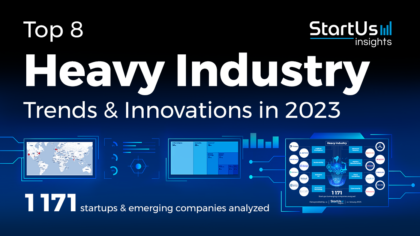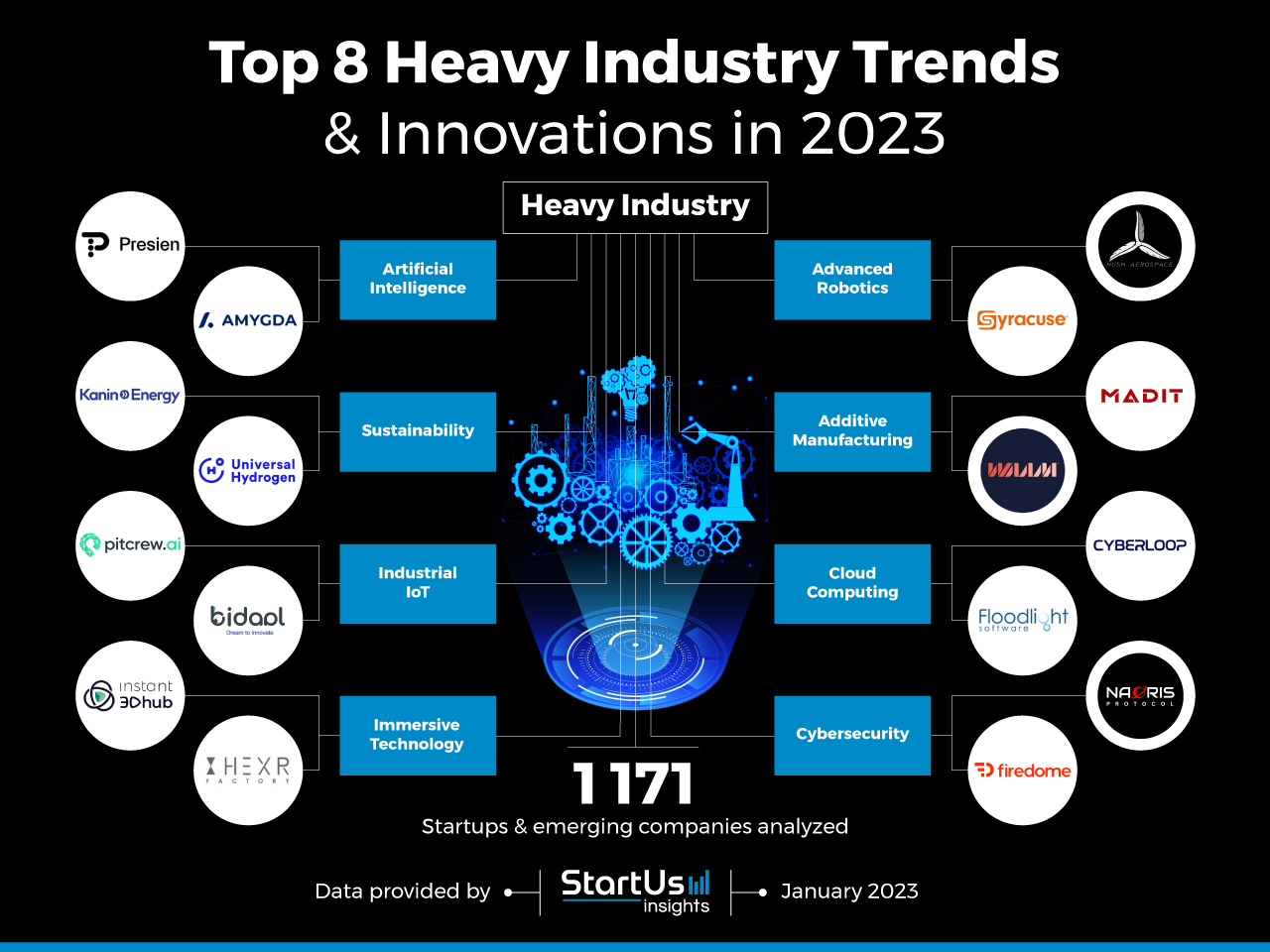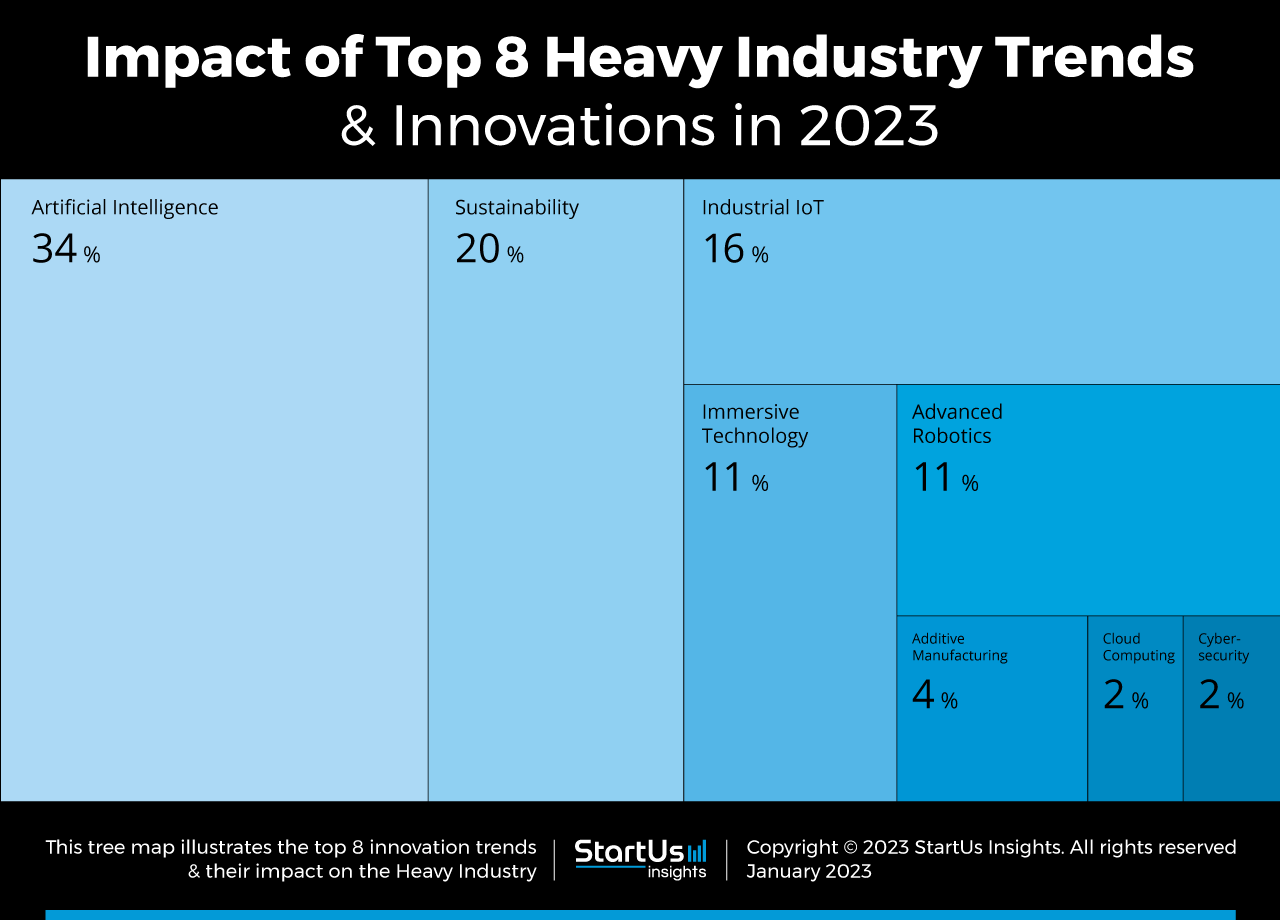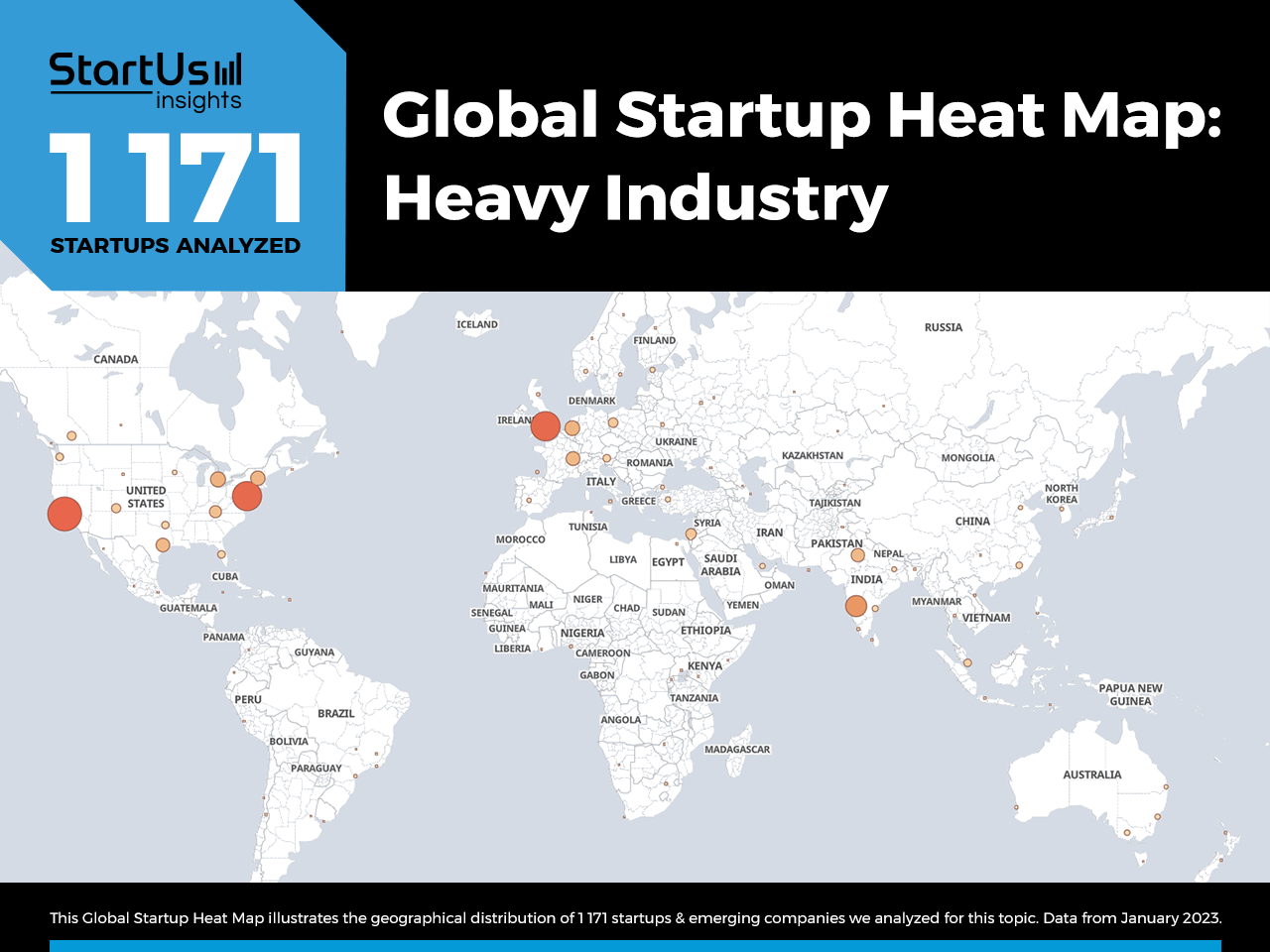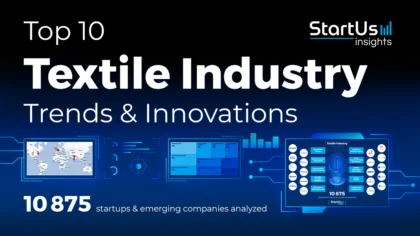Accelerate Productivity in 2025
Reignite Growth Despite the Global Slowdown
Heavy industries are highly capital-intensive to set up and operate, making ceaseless running critical for steady revenue. This makes the integration of any disruptive technology a challenge. Startups and scaleups undertake rigorous design, development, and testing procedures to provide reliable innovative technologies. These innovations aid in the digital transformation of various sectors in the heavy industry improving operational visibility and efficiency. Further, innovations like the internet of things (IoT) and artificial intelligence (AI) enable organizations to collect data from multiple assets in real time. This enables heavy industry manufacturers to make informed decisions to optimize operations and save costs.
Innovation Map outlines the Top 8 Heavy Industry Trends & 16 Promising Startups
For this in-depth research on the Top 8 Heavy Industry Trends & Startups, we analyzed a sample of 1 171 global startups and scaleups. The result of this research is data-driven innovation intelligence that improves strategic decision-making by giving you an overview of emerging technologies & startups in heavy industry. These insights are derived by working with our Big Data & Artificial Intelligence-powered StartUs Insights Discovery Platform, covering 2 500 000+ startups & scaleups globally. As the world’s largest resource for data on emerging companies, the SaaS platform enables you to identify relevant startups, emerging technologies & future industry trends quickly & exhaustively.
In the Innovation Map below, you get an overview of the Top 8 Industry Trends & Innovations that impact 1 171 companies worldwide. Moreover, the Heavy Industry Innovation Map reveals 16 hand-picked startups, all working on emerging technologies that advance their field.
Top 8 Heavy Industry Trends
- Artificial Intelligence
- Sustainability
- Industrial Internet of Things
- Advanced Robotics
- Immersive Technology
- Additive Manufacturing
- Cloud Computing
- Cybersecurity
Tree Map reveals the Impact of the Top 8 Heavy Industry Trends
Based on the Innovation Map, the Treemap below illustrates the impact of the top 8 heavy industry trends in 2023. Advances in heavy industries facilitate continuous improvement and decarbonization, improving efficiency and sustainability. AI-based solutions use machine learning (ML) and deep learning algorithms to optimize operations and extend asset lifetime through predictive maintenance. Alternative materials and fuels are also seeing more adoption in manufacturing facilities to reduce their carbon footprint. Further, industrial Internet of Things (IIoT) systems allow asset owners to monitor and manage machines for improved throughput. Robotics and other automation techniques also reduce human involvement in heavy operations to increase efficiency and ensure worker safety. While immersive technologies like augmented reality and virtual reality guide and train operators for situations where manual intervention is required. Other heavy industry trends include additive manufacturing, cloud computing, and cybersecurity which keep up with the digital world and its security requirements.
Global Startup Heat Map covers 16 Heavy Industry Startups & Scaleups
The Global Startup Heat Map below highlights the global distribution of the 1 171 exemplary startups & scaleups that we analyzed for this research. Created through the StartUs Insights Discovery Platform, the Heat Map reveals that the US and the UK have a high concentration of heavy industry startups, followed by India.
Below, you get to meet 16 out of these 1 100+ promising startups & scaleups as well as the solutions they develop. These 16 startups are hand-picked based on criteria such as founding year, location, funding raised, and more. Depending on your specific needs, your top picks might look entirely different.
Top 8 Heavy Industry Trends for 2023
1. Artificial Intelligence
Conventional data-driven approaches in heavy industries leverage statistical methods where regular manual intervention was necessary. With AI-based techniques like machine learning and deep learning, data processing is becoming efficient and autonomous. This improvement in data handling and analysis allows managers and asset owners to enable predictive maintenance and demand forecasting. AI and sensor data, together, allow manufacturers to create digital twins of critical infrastructure. As a result, it provides real-time visibility into operations and maintenance activities.
Presien provides Dynamic Worker Safety
Australian startup Presien provides an AI-based solution that reduces the threats to safety and wellbeing in industrial environments. It combines camera sensors and a deep convolutional neural network-driven intelligence platform for object recognition, tracking, and distance recognition. This way, Presien detects potentially dangerous situations and alerts the operator to mitigate potential accidents. The solution also scans the work environment and generates automated health and safety reports, aiding the quantification of safety metrics and site performance.
Amygda offers Predictive Maintenance
UK-based startup Amygda develops an equipment-agnostic platform that enables predictive maintenance of industrial equipment. The startup’s platform integrates existing sensor data and enterprise resource planning (ERP) systems. It prevents unplanned downtime by advising asset owners on preventive measures well ahead of time. Additionally, detecting primary damage and initiating maintenance avoids secondary damage and optimizes part life. This reduces maintenance costs and increases operational efficiency.
2. Sustainability
The energy-intensive nature of heavy industrial processes maintains a high carbon footprint for heavy industries. With the emergence of an increased carbon consciousness, heavy industries are subject to carbon reduction goals. To aid this, startups develop sustainable solutions like recycling, alternative raw materials and fuels, electrification, and carbon capture. This allows manufacturers to move away from fossil fuels and adopt a circular economy of materials and energy.
Kanin Energy converts Waste Heat to Power (WHP)
Canadian startup Kanin Energy develops waste heat to power solutions for heavy industry applications. The startup deploys waste heat to power organic Rankine cycle (ORC) systems to convert wasted energy into electricity. ORC turbines are closed-loop systems using an organic fluid that heats up to drive a turbine. This generates green, baseload power with no additional CO2 emissions. Kanin’s turnkey WHP solution thus enables large industries to monetize their waste heat and reduce their negative impact on the environment.
Universal Hydrogen provides a Zero-Carbon Fuel System
Universal Hydrogen is a US-based startup that offers end-to-end solutions for hydrogen-powered flights. The startup’s conversion kit for regional aircraft consists of a fuel cell electric powertrain that replaces the existing turboprop engines. It also includes proprietary, lightweight, aviation-grade modular hydrogen capsules that are transferred directly from green hydrogen production sites to airports. This provides automotive, heavy equipment, maritime, and railroad domains with a safe and quick-in-refueling alternative fuel system.
3. Industrial Internet of Things
Monitoring of industrial assets is critical to the efficient operation and safety of heavy infrastructure and equipment. The conventional sensors and data logging devices require manual efforts for data acquisition and subsequent analysis, creating data silos. In contrast, IIoT integration leads to better connectivity and, in turn, better data accessibility. Smart devices and sensors collect and send data to a web-based platform. This provides real-time visibility into equipment conditions and facilitates asset management to improve resource utilization and maintenance activities.
Pitcrew simplifies Heavy Equipment Fleet Management
Australian startup Pitcrew develops heavy vehicle fleet condition monitoring and analytics solutions. The startup’s technology combines distributed sensors, edge computing, and computer vision to provide real-time fleet data. This allows fleet managers to minimize unplanned vehicle downtimes, avoid compliance infringement accidents, and improve worker safety.
Bidaal facilitates Mining Operations Digitization
Indian startup Bidaal offers an IoT solution to digitize mining operations. The startup’s platform provides real-time analytics to identify the cause of inefficiency in production activities and safety issues. Bidaal also offers a range of smart devices and sensors that aid in land-vehicle equipment management, proximity avoidance warning, and resource optimization. This reduces operational delays and enhances safety by leveraging digital and interconnected mines.
4. Advanced Robotics
Robotic automation from the third industrial revolution still requires manual supervision to perform tasks. Advances in industry 4.0, on the other hand, combine AI and smart IoT devices to enable autonomous robot operation. Consequently. this allows robots to plan and execute tasks with minimal interruptions. Autonomous robots find application in inspection activities, material movement, and surveillance. Besides, they replace humans in remote and dangerous environments, ensuring a safer workplace. Advanced robotics also free up capital and human resources that are otherwise invested in mundane tasks.
Hush Aerospace offers Remote Inspections
US-based startup Hush Aerospace develops unmanned aerial systems and electric verticle take-off and landing platforms. The startup’s platforms aid in performing activities like mapping, surveying/monitoring, and remote deliveries. Its unmanned aerial vehicles (UAV) system provides a safe and cost-effective solution to carry out inspections. This provides vital intel on topographical information and minimizes the safety hazards for the mining, oil, and gas industries.
Syracuse provides Autonomous Crane Operations
Israeli startup Syracuse enables autonomous crane operations. The startup’s motion technology plots the optimal trajectory for each specific crane, load, and real-time worksite map to operate the crane as an industrial robot. This enables the utilization of the crane’s full capabilities and loads characteristics unhindered by human limitations, reducing load transport times.
5. Immersive Technology
Limitations and the high cost of 3D visualization and interactive platforms left engineers and researchers tied to 2D drawings and their projections. Innovations in immersive technologies like virtual reality (VR) and augmented reality (AR) provide an interactive platform with cyber-physical systems. This enables industries to simulate virtual models of their infrastructure, machines, and products and interact with them. Manufacturers use this to improve functional parameter analysis as well as operator training and guidance.
Threedy optimizes 3D Industrial Data Visualization
Threedy is a German startup that offers 3D visualization software to simplify industrial data interpretation. It provides responsive and interactive applications to visualize 3D data of any size without preprocessing or reduction of complexity. The startup’s solution also features the adaptive recognition of device classes from workstations to mobile and mixed reality devices. This enables easy access to AR and VR models and prevents the need for manual preparation, device-specific adaption, or explicit data provisioning.
Hexr Factory enables Industrial Virtualization
Indian startup HexR Factory designs, develops, and builds products and solutions to virtualize industrial safety and training exercises. The startup’s modular and scalable VR training solution provides hands-on practice to aid quick decision-making. Its simulated environment also visualizes the consequences of bad decisions. Further, HexR Factory provides guided work instructions for trainees without the need for special equipment. This delivers consistent training sessions to each worker, saves resources, and enables even a beginner to perform high-level assembly tasks.
6. Additive Manufacturing
Manufacturing requirements of heavy industries usually occur in batches or as individual jobs. Consequently, conventional subtractive manufacturing incurs huge capital investment and generates a large amount of material waste. Additive manufacturing provides heavy industries with a highly flexible and sustainable alternative to conventional manufacturing processes. The development of scalable metal additive manufacturing also makes the transition from design to prototype smooth and cost-effective. In this way, 3d printing enables the rapid prototyping of new components, jigs, fixtures, or supports without additional investment in tooling.
Madit offers Rapid Prototyping
Spanish startup Madit specializes in 3d printing of aluminum, stainless steel, and martensitic steel. The startup’s 3D printers use selective laser melting (SLM) to manufacture parts with high mechanical and thermal resistance while supporting complex geometries. Madit also provides custom post-processing solutions according to reduce production time for functional prototypes, lowering prototyping costs.
WAAM3D enables Large-scale Metal 3D Printing
UK-based startup WAAM3D provides hardware and software solutions for wire arc additive manufacturing (WAAM). The startup’s WAAM system, RoboWAAM, aids in large-scale metal additive manufacturing for the aerospace, energy, marine, and mining industries. It oversees the entire build process and provides process monitoring and governance over various health and safety parameters of the print. The solution simplifies manufacturing operations, reduces the cost of integration, and lowers project lead times.
7. Cloud Computing
Industry 4.0 leads to the massive inflow of data from the upstream and downstream domains of heavy industries. Industrial data storage and handling require an elaborate information technology (IT) infrastructure. Cloud computing systems allow manufacturing facilities to mitigate this capital and time-intensive integration process. It frees them from the burden of setting up and maintaining a complex IT infrastructure. Cloud-based solutions also aid data sharing, enabling on-premise users and remote workforces to collaborate in real-time.
Cyberloop enables Remote Data Acquisition
Cyberloop is an Australian startup that provides cloud-based solutions to perform data monitoring, analysis, and acquisition for heavy industries. The startup’s web application connects with sensors to stream data and other valuable information to its cloud. This allows operators and managers to remotely access all the collected data for analysis, control, and support. For the mining industry, Cyberloop’s AI-based data acquisition system enables smart connectivity for assets in remote mines.
Floodlight streamlines Inspection Management
US-based startup Floodlight offers an inspection management platform for companies handling heavy construction equipment. The startup’s software automates operations from the back office to field activities like inspections and non-destructive tests on large-scale infrastructure. This allows inspectors to carry out more activities with less paperwork. The cloud-based Software-as-a-Service (SaaS) also streamlines inspection management from quote to cash.
8. Cybersecurity
Asset digitization in the heavy industry increases the risk of cyber-attacks and data privacy challenges. Connected industrial control systems and robots pose a great threat to the safety of work environments. This makes cybersecurity one of the top trends among industries to ensure optimal performance and integrity of critical assets. Cybersecurity solutions allow companies to monitor their networks to identify unusual device behaviors and detect threats in real-time. This avoids any security breaches that reduce productivity or unplanned downtimes.
Naoris offers Decentralized Cybersecurity
Portuguese startup Naoris develops a decentralized cybersecurity mesh for the hyperconnected industrial environment. The startup’s resilient, assurance and cybersecurity mesh architecture ensures device integrity and enforces context, operational trust, and policy adherence. This avoids the need to trust centralized vendors or intermediaries. The solution also leverages blockchain to create a machine-to-machine tokenized economy to enforce cybersecurity and best practices in a permissionless manner.
Firedome provides an IoT Security Platform
US-based startup Firedome creates an IoT security platform for industrial applications. The platform detects and prevents cyber threats in real-time and protects industrial assets with robust visibility controls and unusual activity alerts. It also features an AI-enabled engine that secures IoT fleets with 24/7 monitoring. This ensures the optimum performance of all assets connected to the IoT network without the risk of cyber threats.
Discover all Heavy Industry Trends, Technologies & Startups
The top heavy industry trends indicate that innovations in the industry, focus on the digitalization, automation, and sustainability of operations. Deep learning and machine vision lead to the development of defect detection and prescriptive maintenance capabilities while alternative materials and fuels minimize environmental impacts. Further, IIoT innovations provide real-time visibility into operations and improve machine-to-machine communication to ensure fluid operations. Immersive technologies develop a highly collaborative working environment with process guidance and remote expert connectivity. Additionally, the autonomy brought in by advanced robotic solutions increases the efficiency of process execution. Simultaneously, cloud computing and cybersecurity solutions make this transition to data-intensive operations seamless and secure.
The Heavy Industry Trends & Startups outlined in this report only scratch the surface of trends that we identified during our data-driven innovation and startup scouting process. Among others, blockchain, digital twin, and advanced analytics will transform the sector as we know it today. Identifying new opportunities and emerging technologies to implement into your business goes a long way in gaining a competitive advantage. Get in touch to easily and exhaustively scout startups, technologies & trends that matter to you!
